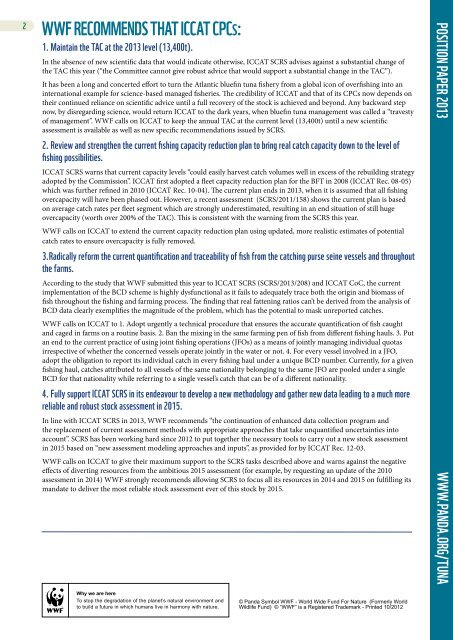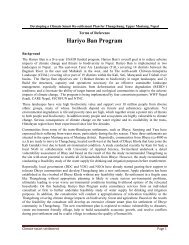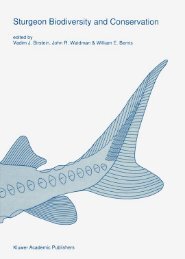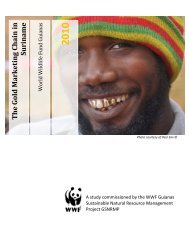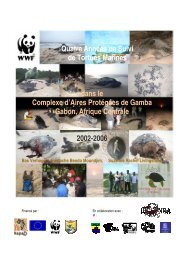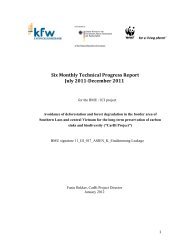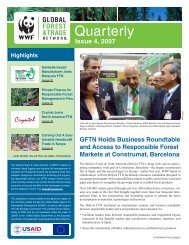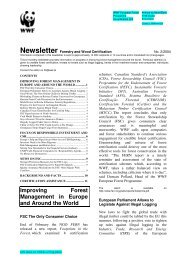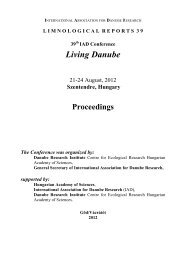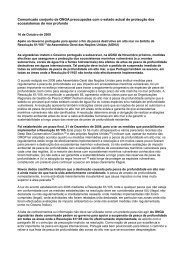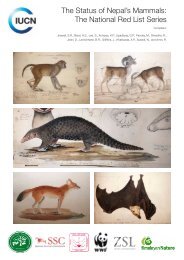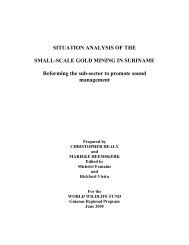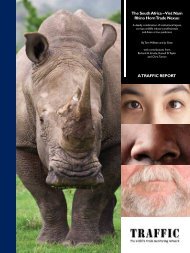ICCAT 2013 WWF position paper - Panda
ICCAT 2013 WWF position paper - Panda
ICCAT 2013 WWF position paper - Panda
Create successful ePaper yourself
Turn your PDF publications into a flip-book with our unique Google optimized e-Paper software.
2<br />
Wwf Recommends That Iccat Cpc s:<br />
1. Maintain the TAC at the <strong>2013</strong> level (13,400t).<br />
In the absence of new scientific data that would indicate otherwise, <strong>ICCAT</strong> SCRS advises against a substantial change of<br />
the TAC this year (“the Committee cannot give robust advice that would support a substantial change in the TAC”).<br />
It has been a long and concerted effort to turn the Atlantic bluefin tuna fishery from a global icon of overfishing into an<br />
international example for science-based managed fisheries. The credibility of <strong>ICCAT</strong> and that of its CPCs now depends on<br />
their continued reliance on scientific advice until a full recovery of the stock is achieved and beyond. Any backward step<br />
now, by disregarding science, would return <strong>ICCAT</strong> to the dark years, when bluefin tuna management was called a “travesty<br />
of management”. <strong>WWF</strong> calls on <strong>ICCAT</strong> to keep the annual TAC at the current level (13,400t) until a new scientific<br />
assessment is available as well as new specific recommendations issued by SCRS.<br />
2. Review and strengthen the current fishing capacity reduction plan to bring real catch capacity down to the level of<br />
fishing possibilities.<br />
<strong>ICCAT</strong> SCRS warns that current capacity levels “could easily harvest catch volumes well in excess of the rebuilding strategy<br />
adopted by the Commission”. <strong>ICCAT</strong> first adopted a fleet capacity reduction plan for the BFT in 2008 (<strong>ICCAT</strong> Rec. 08-05)<br />
which was further refined in 2010 (<strong>ICCAT</strong> Rec. 10-04). The current plan ends in <strong>2013</strong>, when it is assumed that all fishing<br />
overcapacity will have been phased out. However, a recent assessment (SCRS/2011/158) shows the current plan is based<br />
on average catch rates per fleet segment which are strongly underestimated, resulting in an end situation of still huge<br />
overcapacity (worth over 200% of the TAC). This is consistent with the warning from the SCRS this year.<br />
<strong>WWF</strong> calls on <strong>ICCAT</strong> to extend the current capacity reduction plan using updated, more realistic estimates of potential<br />
catch rates to ensure overcapacity is fully removed.<br />
3. Radically reform the current quantification and traceability of fish from the catching purse seine vessels and throughout<br />
the farms.<br />
According to the study that <strong>WWF</strong> submitted this year to <strong>ICCAT</strong> SCRS (SCRS/<strong>2013</strong>/208) and <strong>ICCAT</strong> CoC, the current<br />
implementation of the BCD scheme is highly dysfunctional as it fails to adequately trace both the origin and biomass of<br />
fish throughout the fishing and farming process. The finding that real fattening ratios can’t be derived from the analysis of<br />
BCD data clearly exemplifies the magnitude of the problem, which has the potential to mask unreported catches.<br />
<strong>WWF</strong> calls on <strong>ICCAT</strong> to 1. Adopt urgently a technical procedure that ensures the accurate quantification of fish caught<br />
and caged in farms on a routine basis. 2. Ban the mixing in the same farming pen of fish from different fishing hauls. 3. Put<br />
an end to the current practice of using joint fishing operations (JFOs) as a means of jointly managing individual quotas<br />
irrespective of whether the concerned vessels operate jointly in the water or not. 4. For every vessel involved in a JFO,<br />
adopt the obligation to report its individual catch in every fishing haul under a unique BCD number. Currently, for a given<br />
fishing haul, catches attributed to all vessels of the same nationality belonging to the same JFO are pooled under a single<br />
BCD for that nationality while referring to a single vessel’s catch that can be of a different nationality.<br />
4. Fully support <strong>ICCAT</strong> SCRS in its endeavour to develop a new methodology and gather new data leading to a much more<br />
reliable and robust stock assessment in 2015.<br />
In line with <strong>ICCAT</strong> SCRS in <strong>2013</strong>, <strong>WWF</strong> recommends “the continuation of enhanced data collection program and<br />
the replacement of current assessment methods with appropriate approaches that take unquantified uncertainties into<br />
account”. SCRS has been working hard since 2012 to put together the necessary tools to carry out a new stock assessment<br />
in 2015 based on “new assessment modeling approaches and inputs”, as provided for by <strong>ICCAT</strong> Rec. 12-03.<br />
<strong>WWF</strong> calls on <strong>ICCAT</strong> to give their maximum support to the SCRS tasks described above and warns against the negative<br />
effects of diverting resources from the ambitious 2015 assessment (for example, by requesting an update of the 2010<br />
assessment in 2014) <strong>WWF</strong> strongly recommends allowing SCRS to focus all its resources in 2014 and 2015 on fulfilling its<br />
mandate to deliver the most reliable stock assessment ever of this stock by 2015.<br />
POSITION PAPER <strong>2013</strong> www.panda.org/tuna<br />
© <strong>Panda</strong> Symbol <strong>WWF</strong> - World Wide Fund For Nature (Formerly World<br />
Wildlife Fund) © “<strong>WWF</strong>” is a Registered Trademark - Printed 10/2012


